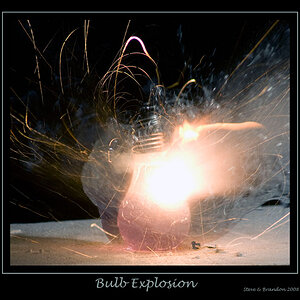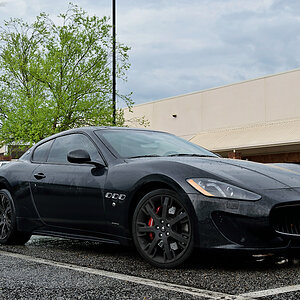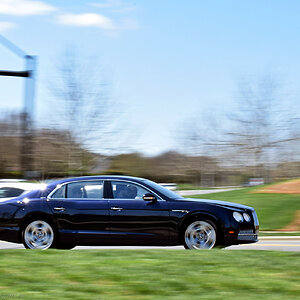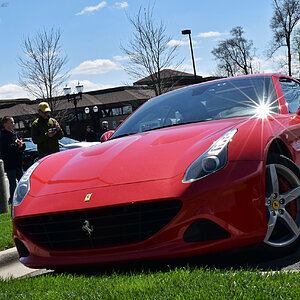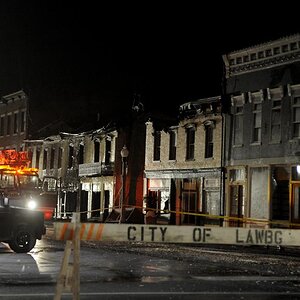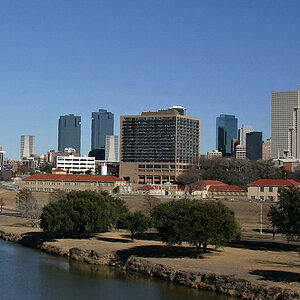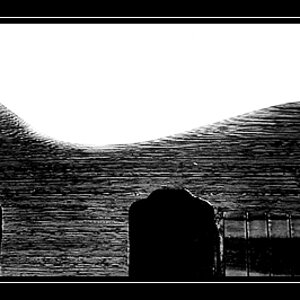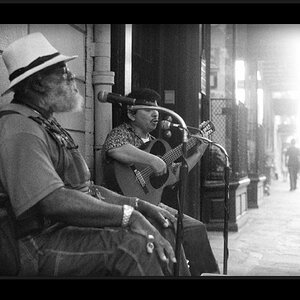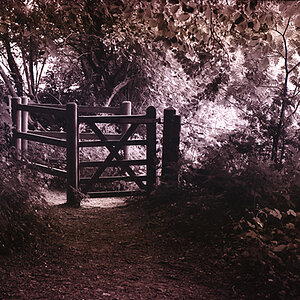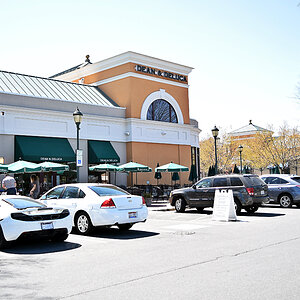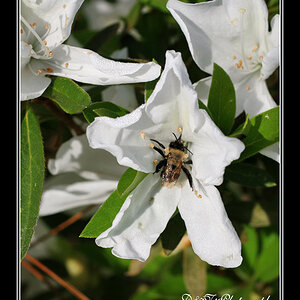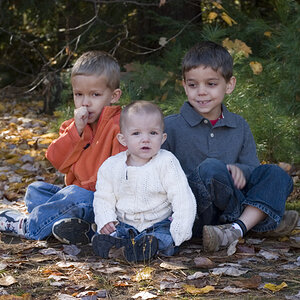Navigation
Install the app
How to install the app on iOS
Follow along with the video below to see how to install our site as a web app on your home screen.
Note: This feature may not be available in some browsers.
More options
You are using an out of date browser. It may not display this or other websites correctly.
You should upgrade or use an alternative browser.
You should upgrade or use an alternative browser.
Macro Filter
- Thread starter burgundy
- Start date
Derrel
Mr. Rain Cloud
- Joined
- Jul 23, 2009
- Messages
- 48,225
- Reaction score
- 18,942
- Location
- USA
- Website
- www.pbase.com
- Can others edit my Photos
- Photos OK to edit
Canon makes a very nice, two-element, achromatic closeup filter or "closeup lens" called the 500D...it's of pretty high quality. It is also available in smaller diameter filter sizes, and is, I think called the 250D in the smaller sizes. The output is suprisingly good when a good lens is used to start with, but I'd give the edge in quality and flexibility to a dedicated macro lens.
NateS
TPF Noob!
- Joined
- Sep 27, 2007
- Messages
- 2,750
- Reaction score
- 39
- Location
- Missouri
- Can others edit my Photos
- Photos NOT OK to edit
As Derrel said, the 500d and 250d are very good lenses/filters...that said, they are only as good as the lens they are mounted on and quite frankly, you will be hard pressed to find a lens that is sharper than a true macro lens. So you take a lens that isn't near as sharp as a true macro and throw a 250d or 500d on the front and....no, it won't be near the quality of a true macro lens.....might not be horrible, but probably won't compare to a dedicated lens.
Stormchase
No longer a newbie, moving up!
- Joined
- Oct 6, 2009
- Messages
- 1,191
- Reaction score
- 108
- Location
- Phoenix Arizona
- Can others edit my Photos
- Photos OK to edit
Use your best glass, prime If you have one and a good filter can produce great shots. As good as a new 1:1 macro... no but for getting.g into macro and trying It out.. I would recommend one. Or tubes depending on the lens of choice. I have a Raynox 250 dioptor and love it. I need to keep practicing tho.
For a beginner go with a filter, teleconverter, or tubes If you dont have the money for a lens.
For a beginner go with a filter, teleconverter, or tubes If you dont have the money for a lens.
Arkanjel Imaging
No longer a newbie, moving up!
- Joined
- Jun 8, 2009
- Messages
- 1,229
- Reaction score
- 160
- Location
- SW Florida
- Can others edit my Photos
- Photos NOT OK to edit
Meh. Easiest way to go macro is with reversing rings.
- Joined
- May 1, 2008
- Messages
- 25,465
- Reaction score
- 5,066
- Location
- UK - England
- Website
- www.deviantart.com
- Can others edit my Photos
- Photos OK to edit
The choice of going with a filter or not depends upon the lenses that you currently have access to.
Macro filters (correctly called diopters) work by removing a lenses infinity focus and also reducing the lenses minimum focusing distance. The result is that you lose the ability to focus on further off subjects (how far is determined by the power of the diopter and the lens you are using it on) whilst gaining the ability to focus closer and thus increase the magnification factor of the resulting photo.
However focal length also comes into play and diopters give you more magnification on longer focal lengths than they do on shorter ones. Thus most people consider them best paired with longer glass rather than shorter.
Extension tubes on the other hand, which are hollow tubes that fit between lens and camera body, do the same thing as the diopters, but they work better for a shorter focal length lens than on longer ones. The rough math is tube length divided by focal length of the lens, o for example a :
50mm lens with 50mm of tube gives:
50/50 = 1:1
100mm lens with 50mm of tube gives:
50/100 = 0.5:1
Where the ratio is:
"Size of the subject as reflected by the lens on the cameras sensor" : "Size of the subject in real life"
So the larger the number on the left the more magnification you get - true macro is considered 1:1 and is what all true macro lenses are capable of achieving (note that this is true only of almost all of the prime macro lenses (single focal length lenses) whilst the zoom lenses with macro in the name are normally 0.5:1 or less and the macro is simply a marketing tool used to describe close focusing).
Furthermore I would add that both tubes and diopters come in low budget and higher budget options. The low budget diopters are poor quality glass and will activly degrade your resulting image quality. Meanwhile the cheaper extension tubes will not have electrical contacts and so will mean that you cannot control your lens (aperture control and AF control is lost).
The good options on the market include:
Diopters:
Canon 500D and 250D
Raynox diopters (they make a wide range and all are highquality optics- the DCR250 and DCR 150 are popular choices).
Extension tubes:
Kenko AF tubes.
The canon own brand extension tubes (as well as the nikon) are very overpriced and most people go for the kenko tubes for good quality building and affordable prices.
Note also that whilst extension tubes don't add glass to your setup they will degrade image quality - however the degradation is very minor and not worth worrying about in most cases. Diopters are also often frowned upon for being "glass attachments" however quality diopters (like those listed above) are highgrade glass and will (like tubes) have only minimal effects upon your overall image quality
Generally speaking I would say if you have lenses under 100mm in focal length to use get extension tubes (one set of kenko should be more than enough) whilst if you have lenses longer consider getting diopters.
Macro filters (correctly called diopters) work by removing a lenses infinity focus and also reducing the lenses minimum focusing distance. The result is that you lose the ability to focus on further off subjects (how far is determined by the power of the diopter and the lens you are using it on) whilst gaining the ability to focus closer and thus increase the magnification factor of the resulting photo.
However focal length also comes into play and diopters give you more magnification on longer focal lengths than they do on shorter ones. Thus most people consider them best paired with longer glass rather than shorter.
Extension tubes on the other hand, which are hollow tubes that fit between lens and camera body, do the same thing as the diopters, but they work better for a shorter focal length lens than on longer ones. The rough math is tube length divided by focal length of the lens, o for example a :
50mm lens with 50mm of tube gives:
50/50 = 1:1
100mm lens with 50mm of tube gives:
50/100 = 0.5:1
Where the ratio is:
"Size of the subject as reflected by the lens on the cameras sensor" : "Size of the subject in real life"
So the larger the number on the left the more magnification you get - true macro is considered 1:1 and is what all true macro lenses are capable of achieving (note that this is true only of almost all of the prime macro lenses (single focal length lenses) whilst the zoom lenses with macro in the name are normally 0.5:1 or less and the macro is simply a marketing tool used to describe close focusing).
Furthermore I would add that both tubes and diopters come in low budget and higher budget options. The low budget diopters are poor quality glass and will activly degrade your resulting image quality. Meanwhile the cheaper extension tubes will not have electrical contacts and so will mean that you cannot control your lens (aperture control and AF control is lost).
The good options on the market include:
Diopters:
Canon 500D and 250D
Raynox diopters (they make a wide range and all are highquality optics- the DCR250 and DCR 150 are popular choices).
Extension tubes:
Kenko AF tubes.
The canon own brand extension tubes (as well as the nikon) are very overpriced and most people go for the kenko tubes for good quality building and affordable prices.
Note also that whilst extension tubes don't add glass to your setup they will degrade image quality - however the degradation is very minor and not worth worrying about in most cases. Diopters are also often frowned upon for being "glass attachments" however quality diopters (like those listed above) are highgrade glass and will (like tubes) have only minimal effects upon your overall image quality
Generally speaking I would say if you have lenses under 100mm in focal length to use get extension tubes (one set of kenko should be more than enough) whilst if you have lenses longer consider getting diopters.
Petraio Prime
TPF Noob!
- Joined
- May 28, 2010
- Messages
- 1,217
- Reaction score
- 0
- Location
- Ohio
- Can others edit my Photos
- Photos NOT OK to edit
Is macro filter recommended for beginner? Is the output as good as macro lens? Any suggestion of a good brand?
A simple 'plus' lens filter is ok at small strengths, but for extreme close-ups you should get a true macro lens.
- Joined
- May 1, 2008
- Messages
- 25,465
- Reaction score
- 5,066
- Location
- UK - England
- Website
- www.deviantart.com
- Can others edit my Photos
- Photos OK to edit
You say that buuut:
My thoughts on MP-E 65mm | Flickr - Photo Sharing!
A Summar 12cm f4.5 + Raynox 12diopter was able in that test to beat the quality of a dedicated 5:1 macro lens. Cheap diopters (macro filters) are what they are, they do the job but are cheap and likely to do a poor job. Whilst a reasonable sum and a good quality diopter is something that can go in the bag long term as something that can be used again and again either for a quick light setup in the field when you don't want to carry more lenses or for when you want to boost the magnification of an existing macro lens
My thoughts on MP-E 65mm | Flickr - Photo Sharing!
A Summar 12cm f4.5 + Raynox 12diopter was able in that test to beat the quality of a dedicated 5:1 macro lens. Cheap diopters (macro filters) are what they are, they do the job but are cheap and likely to do a poor job. Whilst a reasonable sum and a good quality diopter is something that can go in the bag long term as something that can be used again and again either for a quick light setup in the field when you don't want to carry more lenses or for when you want to boost the magnification of an existing macro lens
Similar threads
- Replies
- 15
- Views
- 414
- Replies
- 1
- Views
- 105

